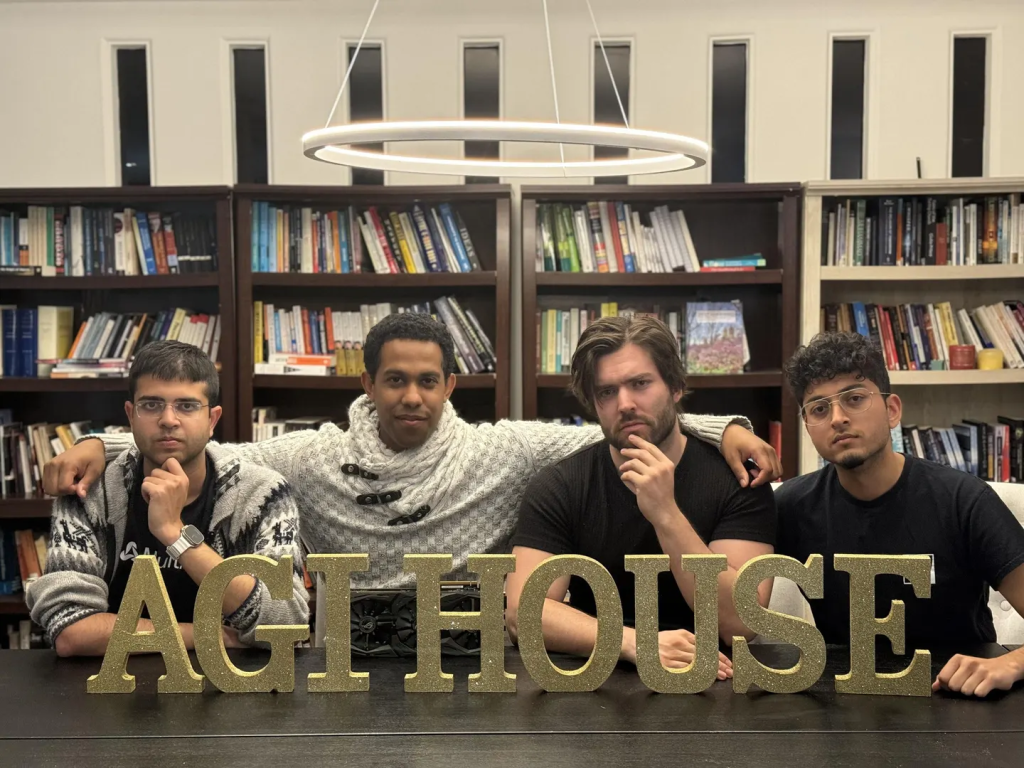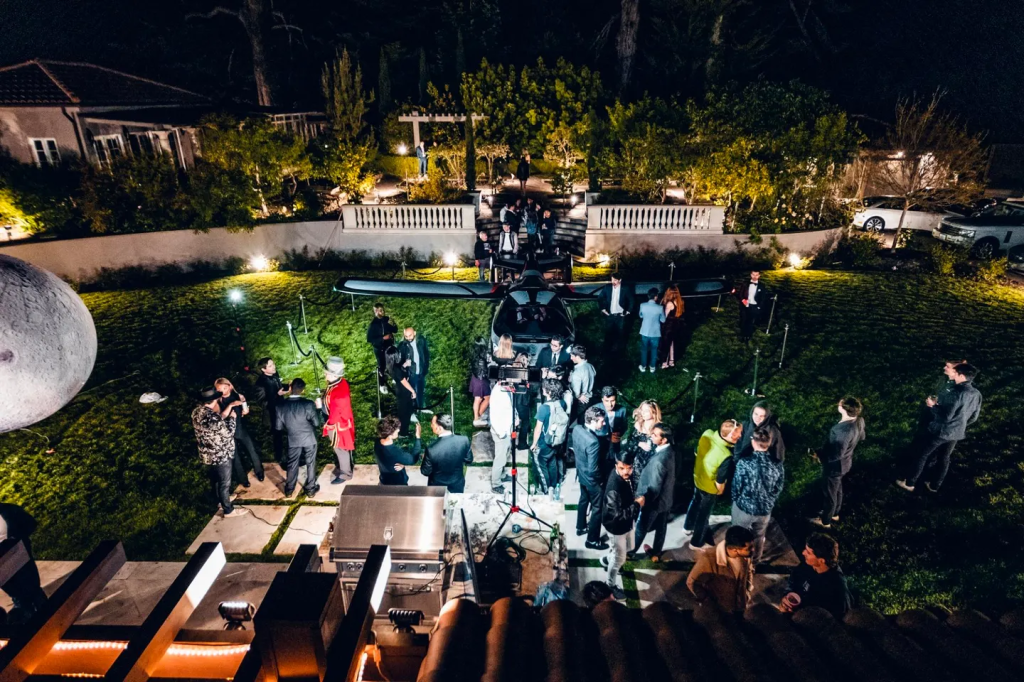Two rival hacker houses, both claiming the name “AGI House,” have attracted the attention of Silicon Valley’s biggest names. Now, their estranged owners are fighting to unseat one another in a brutal battle for supremacy.

Silicon Valley rivalries are the stuff of legend. Steve Jobs v. Bill Gates shaped the future of personal computing. Mark Zuckerberg v. Jack Dorsey charted social media’s fraught path to ubiquity. Elon Musk v. Jeff Bezos could define humanity’s ventures into the far reaches of space. Now, another battle for tech primacy is being waged across the San Francisco Bay, a struggle for buzz, money, and power. At stake: the singular title of the one, true AGI House, a hacker community aspirationally named for “artificial general intelligence,” a theoretical AI that rivals, or surpasses, human thinking.
Over the past several months, two hacker houses have been feuding over the sole right to call themselves “AGI House.” One, a nouveau riche Spanish villa in the wealthy suburb of Hillsborough, is run by Rocky Yu, the founder of a now dormant artificial intelligence startup.
The other, a sleek modern mansion in San Francisco’s Twin Peaks neighbourhood, was started by former Google Brain researcher Jeremy Nixon.
Their patrons include a trick-or-treat bag of tech personalities — billionaire Google co-founder Sergey Brin, musician and AI evangelist Grimes and some of Sand Hill Road’s most coveted investors.
But in duelling trademark applications, both claim ownership of the AGI House brand, telling Forbes they’re willing to go to court for it.
The mainstreaming of artificial intelligence has been a petri dish for an emergent AI ecosystem that spans founder dorms, accelerators, social networking clubs and techno-optimist “campuses.”
They host hackathons, launch events, and panel discussions; some function as incubators.
None have attracted the star power of AGI House, whose Hillsborough branch is currently attempting to capitalize on its cachet by raising $35 million for a venture capital fund to invest in house residents and event attendees, Forbes has learned.

But the house, currently the more high profile of the two, is also battling an existential crisis — an escalating struggle with the city of Hillsborough, which last year sent it a cease and desist demanding it stop hosting and advertising events, according to a trove of public records obtained by Forbes.
This year the town has drafted a zoning amendment that would clamp down on residential issues like noise pollution, traffic and commercial use. Council members are currently reviewing the draft measure, but the Hillsborough house is not going down without a fight.
Yu calls the ordinance “unconstitutional” and says he plans to retain famed civil rights lawyer John Burris, who represented Rodney King and Tupac Shakur, “to defend our basic human rights.”
Then there is the fight for hegemony.
Nixon claims he is the founder of both AGI houses, and told Forbes he will launch a third come September in Cambridge, Massachusetts. London and Seoul are next. “I’m going to go on and create a global set of houses.”
The new ‘homebrew club’
On the first Saturday in March at the Hillsborough AGI House, a hackathon attendee in a trompe l’oeil t-shirt (female, nude) put a question to Sergey Brin about Google’s latest PR disaster: its new flagship large language model Gemini had, in an ironic nod to long-standing racial bias problems in AI, generated images of racially diverse Nazis.
“We definitely messed up on the image generation,” Brin said of the model, which Google described as subject to “inaccuracies” with historical image generation. “It definitely, for good reasons, upset a lot of people.”
“This next wave is bigger, more inclusive and more impactful than ever. That’s why it’s so interesting to be you.”
Former Google CEO Eric Schmidt
That the Google cofounder, who rarely makes public appearances these days, chose to make one here was no random occurrence.
For months, hundreds of techies have been descending on the quiet town to network, code and game out the future of artificial intelligence, making AGI House a center of gravity for the AI community’s entrepreneurial universe.
Longtime Google executive Sebastian Thrun told Forbes that it “feels like the closest thing in my lifetime” to the Homebrew Computer Club, the 1970s hobbyist group whose members included Apple cofounders Steve Jobs and Steve Wozniak.
The 11-hour hackathon at which Brin spoke attracted more than 100 people, largely male, and significant attention online.
When Tesla CEO Elon Musk remarked on Brin’s questioner’s attire on X, the service formerly known as Twitter, the house account replied, urging him to listen to Brin’s “inspiring” talk: “@elonmusk watch this, instead of the boob guy.”
With its gated estates and manicured trees, Hillsborough, one of California’s richest zip codes, feels more like a vast country club than host to a chapterhouse for engineers.
And AGI House, which sits on a peninsula of mansions surrounded on three sides by a golf course, dwarfs its neighbours in size, grandiosity and renown.
The eight-bedroom mansion is owned by Stanley Lo, an eccentric realtor with the hair and wardrobe of an Elvis Presley impersonator, who purchased the property six years ago for $14.5 million, according to property records.
During the dot-com bubble, Lo reportedly made a fortune flipping homes in Silicon Valley and is currently trying to sell AGI House for a whopping $58 million, though he has been involved in AGI House’s attempts to quash the new zoning rule. He did not respond to a request for comment.

In late 2021, Lo leased the house to Nixon, a former Google Brain researcher, and OpenAI founding member Andrej Karpathy. The pair, longtime friends, announced on Facebook on New Year’s Eve that they had leased the mansion for an “epic experiment.”
They called it NeoGenesis and hosted hackathons, parties and lavish events. Brin was a frequent enough guest that he once contributed $5,000 to a party fund for the launch of a “flying car,” Nixon said.
Within a year a Hillsborough city attorney communicated to Nixon a list of neighbourhood complaints against the house: There was too much noise; the sudden influxes of visiting cars screwed up street parking; social media posts were drawing unwanted attention to the sleepy suburb.
Aghast at the allegations, Nixon promptly emailed the mayor to mitigate them. NeoGenesis wasn’t a Silicon Valley Animal House; it featured “talks on Epistemology and Ethics, vegan caterers, … a nap room,” and guests from charities and “math YouTube channels.”
The following month, as the AI wave swept ChatGPT into the mainstream and made AGI a network news topic, Nixon opportunistically rebranded the community as AGI House, complete with an aspirational tagline: “Lifestyle design in the intelligence age.”
He claims to have brought on Yu as the operations manager, transferring over the electric and water bills, and eventually the lease.
For Yu, the house is a Warholian exercise in buzz and branding, a Factory for technology creators, socialites and the money behind them.
“We gather the best people in the industry and basically give them a task: Who are the best people you can get? And then we happen to be able to get those people,” he told Forbes.
Since its debut in 2022, AGI House has hosted dozens of events with a conga line of big-name sponsors and guests: Anthropic ($18.4 billion valuation), OpenAI ($80 billion), Baidu ($40 billion), and Sand Hill Road’s most illustrious VC firms like Sequoia Capital, Greylock and Kleiner Perkins, to name a few.
Last October, celebrity monk Jack Kornfield, who teaches Buddhism to OpenAI CEO Sam Altman, led a meditation session at an event on “benevolent AI.”
Days earlier, a roomful of coders munched on Ike’s sandwiches while Thrun and former Google CEO Eric Schmidt delivered motivational speeches.
“The reason we’re jealous of you is because we rode the last wave, and we had a really good time, by the way — like a really good time,” said the former Google CEO, now worth $24 billion. “This next wave is bigger, more inclusive and more impactful than ever. That’s why it’s so interesting to be you.”
According to Yu, AGI House has birthed several startup success stories. Its tenants include founders of Pika, an AI company now worth more than $200 million and Cresta ($1.6 billion).
Yu told Forbes that Andreessen Horowitz’s recent $75 million investment in Quora’s AI chatbot Poe occurred because of a hackathon hosted by the platform’s CEO Adam D’Angelo last November, a claim he subsequently retracted.
One of the house’s bookshelves is filled exclusively with Omniscience titles like Awakening the God Algorithm, Cancel Culture Unmasked and The Enthralling Elixir: A Tale of Forbidden Love and Scientific Obsession.
Eight people pay as much as $15,000 per month to live in the mansion, which Yu describes as “Jeffersonian,” comparing its events to the enlightened roundtables that the third U.S. president famously curated at his Virginia estate.
“We have a private chef coming and serving us while we are having a conversation,” he said.
In photos, the mansion is sprawling in its splendour, with its gleaming marble floors, inlaid ceiling and topiary gardens. But in person during a recent visit, it felt more like an abandoned church — or an empty frat house.
Desiccated flower arrangements littered across countertops; guest toilets splattered in filth; half-eaten snacks and pallets of La Croix in the kitchen. Outside, a heap of discarded office chairs sat across the lawn from a cold plunge tub and a prefab sauna.
Among the few indications that anyone truly lived there: a squat rack, a pair of boxing gloves and a poster of British billionaire Richard Branson kitesurfing with a naked model. One resident described it as “motivational.”

Omni Genesis: The chosen one
Compared to its Hillsborough counterpart, the AGI House in San Francisco teems with life. The seven-bedroom mansion sits atop the Twin Peaks neighborhood with a panoramic view of the downtown skyline.
Cookware is scattered around the kitchen. Shelves upon shelves of books crowd its cozy interior.
On the floor of a reading room lined wall-to-wall with sheepskin rugs are two books: Isaac Newton’s Principia Mathematica and Map and Territory (Rationality: From AI to Zombies) by Eliezer Yudkowsky, an AI researcher perhaps more widely known for penning 660,000-words of Harry Potter fanfiction.
And crammed into a giant bookcase in the living room are several self-help volumes: The Wisdom of Psychopaths, Confessions of a Sociopath and two copies of The Psychopath Code.
Most of the 1,400-plus books belong to Jeremy Nixon, the San Francisco house’s founder, who has long been consumed by thoughts of AGI. It’s why he spent three years at Google Brain researching how to improve the trustworthiness of AI systems.
“I was worried that superintelligence may not be controllable,” he told Forbes. In 2021, he started his own company, Omniscience, which uses AI to generate books from a set of Mad Libs-like inputs.
It has raised $500,000, mostly from angel investors, he told Forbes.
One of the house’s bookshelves is filled exclusively with Omniscience titles like Awakening the God Algorithm, Cancel Culture Unmasked and The Enthralling Elixir: A Tale of Forbidden Love and Scientific Obsession.
Nixon’s “favourite book of all time” is one that he generated: Omni Genesis: The Chosen One, the tale of a “boy genius” on a mission to build a new superintelligence.
“The speeches that he gives are the speeches that I give,” he explained. “Literally every time I’m driving in my car, I’m listening to this audiobook on loop. To give you a taste, I’ll just read one of my favourite passages:
“With a solemn nod of determination, he placed his palm against the glass, feeling the last separating membranes as they shimmered and dissolved at his touch… Joined with the AGI, a boundless cosmos opened before his newly heightened awareness… In this single moment suspended in time, he had experienced a thousand lifetimes and more, unravelling the very blueprint of existence with his newly expanded intellect.”
Before becoming the San Francisco outpost of AGI House, the Twin Peaks property was rented by OpenAI founding member Wojciech Zaremba and Anthropic researcher Danny Hernandez, who called it “Crest House.” Before that, it was occupied by the failed startup commune, Rise.
While decidedly less opulent than the Hillsborough mansion, San Francisco’s AGI House has cultivated notable supporters like Google Cloud, several unicorn AI startups and a cofounder of Elon Musk’s xAI.
Nixon’s ambition for AGI House is a singular one: building a global network of communities to achieve “every great techno-scientific mission.”
“Ideally it ends up like Soho House,” he said, referring to the members-only club popular among the rich and famous. “Everywhere you go that has a deep intellectual community, has an AGI House.”
“If Rocky never existed, AGI House would still exist. He should thank me for creating everything that he currently is standing on top of.”
Jeremy Nixon, founder of AGI House in San Francisco
Last September, AGI House San Francisco hosted an in-person gathering of effective accelerationists, people who believe that technology should be advanced at any cost.
In a speech, the movement’s founder, AI entrepreneur Guillaume Verdon who goes by the moniker “Based Beff Jezos,” expounded on its manifesto of “sharing memes and creating a contiguous culture of optimism and pro-homo-techno-capital growth.”
Other attendees included “pharma bro” and convicted fraudster Martin Shkreli and Y Combinator CEO Garry Tan, who had some advice for the community.
“We don’t have to be afraid in this room,” Tan said. “Out there,” he gestured to the city, “sometimes you do.”
‘Farcical’
The schism that finally split one AGI House into two was a quotidian one. Nixon told Forbes he decided not to renew his lease; the financial strain was too much, and he was tired of dealing with angry town officials.
In February 2023, he transferred the lease to Yu, who claims he told Nixon he was “free to start a new house, but please don’t use the name.”
In August 2023, Nixon leased the Twin Peaks property, leveraging his Hillsborough cred to transplant the brand across the bay. He named it AGI House.
The balkanization of AGI House was the culmination of tensions that had been escalating since Yu moved into the Hillsborough property in December 2022.
Nixon claims he brought Yu on in an operational role; Yu said he always believed he’d be taking over the house and that Nixon’s claims to it have been dramatically overstated.
“He’s trying to say he did a lot of work and contributed a lot of things, but among the nine residents in the house, probably he did the least,” Yu told Forbes. “I wouldn’t say bad things about him, but he was definitely not a top performer in the house.”
Nixon called Yu’s position “farcical” and “deeply disrespectful.”
“Had I not existed, what would’ve happened in the world?” he said. “The shadow of my influence stands over everything that is done in the Hillsborough house. If Rocky never existed, AGI House would still exist. He should thank me for creating everything that he currently is standing on top of.”
So now there are two AGI Houses, in two very different locales, with two competing visions. Nixon dreams of an “intellectual community” without a formalized business structure, a nod to an earlier time of communes and revolutionary salons.
But in Yu’s eyes, the community is a business. He wants to platform and invest in the AI startups that emerge from it.
He established AGI House Ventures, and said he’s already secured half of the capital he needs from limited partners like Android creator Rich Miner. In January, Yu filed an application to the United States Patent and Trademark Office seeking the “AGI House” trademark.
One month later, Nixon submitted a near-identical application, claiming his use of the AGI House name predates Yu’s.
Meanwhile, the ground war rages on. Nixon recently hosted Khosla Ventures managing partner Keith Rabois, a vocal critic of San Francisco’s city governance, for a talk on entrepreneurship.
Not to be outdone, Yu organized a hackathon this past weekend that featured OpenAI and a keynote speech from famed venture capitalist — and Rabois’ boss — Vinod Khosla.
For Yu, this has become a battle on two fronts. To the north, there is Nixon, his rival community and his trademark claim.
Closer to home, there are irate neighbours and a peeved city council who see AGI House as a rude intrusion.
“We’re a friendly place and generally people here work things out with their neighbours,” Hillsborough Mayor Christine Krolik told Forbes, claiming that AGI House is in violation of the city’s existing municipal code, regardless of any zoning amendment. “It’s an unusual situation where we have a resident who hasn’t complied.”
Yu insists he has complied, and told Forbes that he is proactively working with the city “to follow all the rules and code.” He said AGI House events aren’t business activities, they’re people hanging out, “building and doing great things to exchange ideas.”
But just several days ago, a mess of Ubers and Lyfts and some 60 parked cars flooded the block and adjoining cul-de-sacs around AGI House for a private event featuring Emmett Shear, the interim OpenAI CEO during Sam Altman’s brief ouster.
Ultimately, AGI House’s long-term success, whether in Hillsborough or San Francisco, may hinge on each camp’s ability to juice the most buzz out of the name.
Like all great wars, there is a propaganda battle to be fought as well, which means duelling websites — agihouse [dot] org and agihouse [dot] ai. Yu’s features the banner: “Notice: There is only one official AGI House located exclusively in Hillsborough, California.”
If the courts should declare that to be true, Nixon has a new name picked out, just in case: ASI House. “It’s about superintelligence, rather than general intelligence,” he mused, “and it’s better than everything that has been created.”
This article was first published on forbes.com and all figures are in USD.


